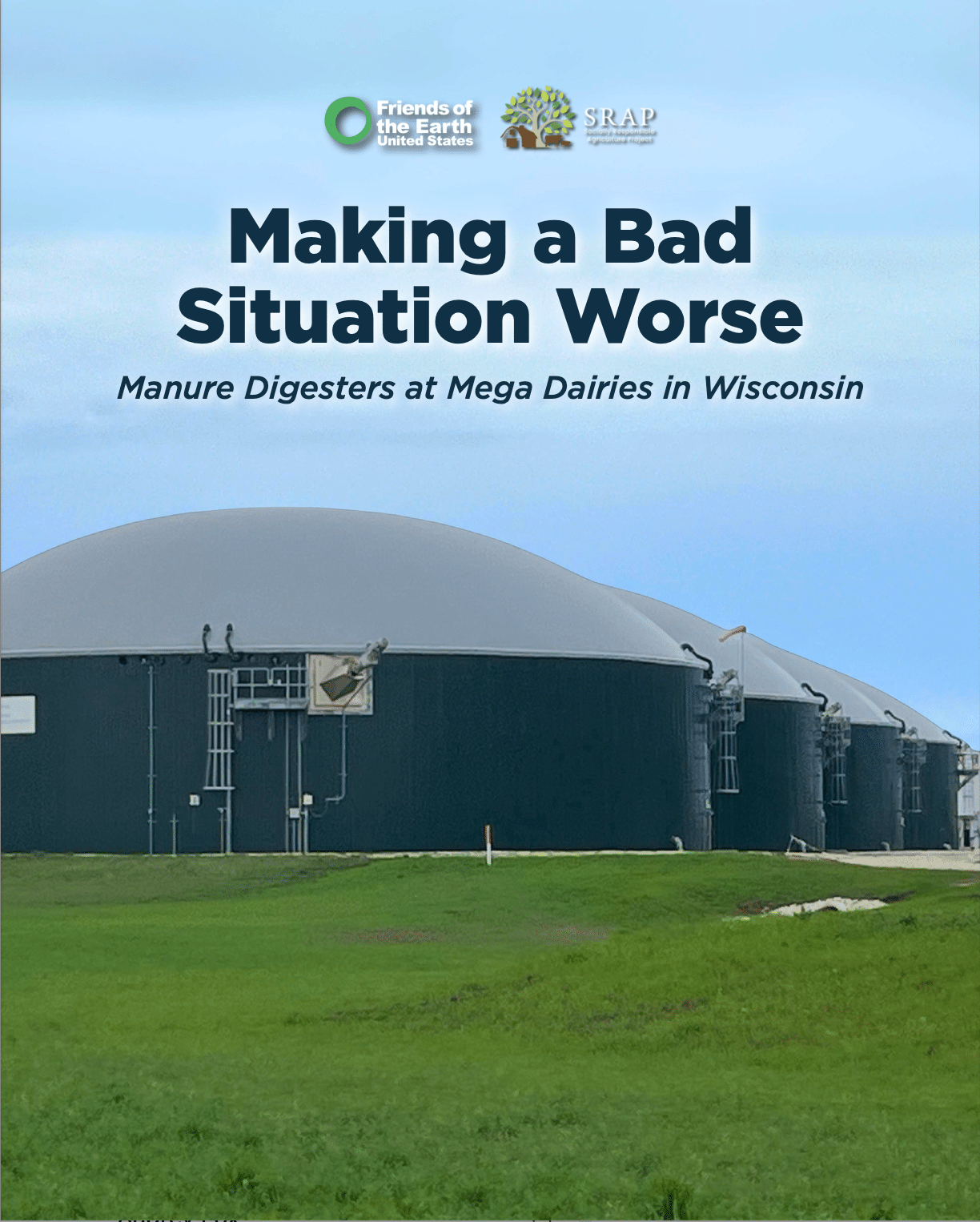Making a Bad Situation Worse: Manure Digesters at Mega Dairies in Wisconsin

New report finds dramatic herd size growth on Wisconsin mega dairies with manure digesters.
Friends of the Earth and Socially Responsible Agriculture Project have co-published a new report, Making a Bad Situation Worse: Manure Digesters at Mega Dairies in Wisconsin. The report, based on government data and interviews with local residents, documents the harmful community impacts associated with the rapid growth of anaerobic digesters in Kewaunee County, Wisconsin.
Watch our webinar here
Watch our campaign video here
Digesters are employed to capture methane emissions from animal waste to produce manure biogas, also known as factory farm gas — which can generate electricity or be processed into transportation fuel. However, factory farm gas systems not only fail to resolve the negative environmental and public health impacts of concentrated animal feeding operations (CAFOs), but they exacerbate pollution and safety risks to communities living near industrial livestock operations and biogas plants. Digesters also entrench the current, inherently unsustainable system of factory farms — all for overstated and inadequate methane reduction benefits.
In Kewaunee County, herd sizes at mega-dairies with digesters grew by 58%, an annual year-over-year herd size increase of 5.2%, 52 times the growth rate for overall dairy herd sizes. Previous research found that across Wisconsin, CAFOs with digesters grew by 2.4% year-over-year, while industrial livestock operations in the state without a digester had an annual year-over-year herd size increase of just 0.1%.
Subsidies for digesters and policies like the federal Renewable Fuel Standard (RFS) and California’s Low Carbon Fuel Standard (LCFS) are cornerstones of government efforts to curb industrial animal agriculture’s climate-warming methane emissions. Unfortunately, they create perverse incentives for livestock operations to maximize methane yield to receive lucrative payments for biogas.
In addition to exponential herd size growth and continued pollution from CAFOs, the report finds that dangerous spills, increased ammonia emissions, and damage to local infrastructure have all accompanied the proliferation of manure digesters.
In Kewaunee County, herd sizes at mega-dairies with digesters grew by 58%, an annual year-over-year herd size increase of 5.2%, 52 times the growth rate for overall dairy herd sizes. Previous research found that across Wisconsin, CAFOs with digesters grew by 2.4% year-over-year, while industrial livestock operations in the state without a digester had an annual year-over-year herd size increase of just 0.1%.
Subsidies for digesters and policies like the federal Renewable Fuel Standard (RFS) and California’s Low Carbon Fuel Standard (LCFS) are cornerstones of government efforts to curb industrial animal agriculture’s climate-warming methane emissions. Unfortunately, they create perverse incentives for livestock operations to maximize methane yield to receive lucrative payments for biogas.
In addition to exponential herd size growth and continued pollution from CAFOs, the report finds that dangerous spills, increased ammonia emissions, and damage to local infrastructure have all accompanied the proliferation of manure digesters.
Policy Recommendations
The report recommends that rather than investing in manure biogas, public resources should be redirected to more effective methane reduction solutions that do not exacerbate environmental injustice and industry consolidation. Other policy recommendations include:
- Do not fund or incentivize manure biogas.
- Prohibit installation of new liquid manure handling systems, such as waste lagoons, in Wisconsin.
- Prohibit construction of new large CAFOs and expansion of those currently operating in Wisconsin.
- Regulate waste from CAFOs and digesters, including treatment and application of digestate.
- Strengthen and enforce nutrient management plan violations to ensure compliance through the Wisconsin Pollutant Discharge Elimination System (WPDES) program. Impose meaningful penalties on repeat offenders, including suspension of permits.
- Protect and support meaningful local control over anaerobic digester operations by Wisconsin localities to address issues related to road damage, fires, explosions, and biosecurity.
- Require CAFO operators to provide “real-time” reporting on water usage and locations of manure-hauling trucks.
- Prohibit more than one CAFO from sharing land application sites.
- Incentivize farmers to adopt regenerative agricultural practices that decrease farmers’ input costs, reduce erosion, improve soil health, produce more nutrient-dense foods and mitigate climate change.
- Put conditions on CAFO permits to reduce public health and environmental harms, including by limiting herd sizes.
- Require and improve methane monitoring and reporting from livestock operations.
- Pursue methane reduction strategies that support environmental justice and fair markets for producers, including regulating methane emissions from industrial livestock facilities, leveraging statewide food procurement toward plant-forward menus, reducing food waste, and prioritizing conservation funding for pasture-based livestock production.
- Require disclosure of basic data from CAFOs and digester operators. Fund and conduct research to assess the impact of manure biogas policies on methane emissions, industry consolidation, and rural communities.
Ways to Support Our Work

Read Latest News
Stay informed and inspired. Read our latest press releases to see how we’re making a difference for the planet.

See Our Impact
See the real wins your support made possible. Read about the campaign wins we’ve fought for and won together.

Donate Today
Help power change. It takes support from environmental champions like you to build a more healthy and just world.